Music Counts For Something
by Andrew McMillen
We asked some top independent artists to speak specifics on the art of selling music in the digital age – and to advise up-and-comers on how not to get rorted.
Throughout the history of recorded music, album sales were a strong indicator as to artists’ personal wealth. The equation used to go: gold and platinum record sales + sold out tours = money in the bank. But in 2010, people are less and less likely to pay for recorded music, with the equation continuing to shift away from sales toward touring.
The Presets
The Presets’ Julian Hamilton is blunt when discussing musical economics, as an ambassador for APRA – the Australasian Performing Right Association – might well be. “These days, if you want to be a working musician can’t just rely on record sales to make money,” he says.
According to Julian, music sales through publishing account for “around a third or a quarter” of The Presets’ overall income. “But it’s tricky because the way that musicians earn money is so varied, through so many different revenue streams that come in at different times. Some months, you might make no money.”
His advice to aspiring musos: “Try to keep the creative and business sides of the bands different: don’t talk about money when you’re rehearsing, and don’t talk about lyrics when you’re in a business meeting. Set up a group account under the band’s name, where all members can see where the money’s going.”
“If you can sort the shitty business side out, so that you don’t worry about it, that’s gonna make the fun stuff even more fun.”
Gotye
Under the pseudonym Gotye, Wally de Backer put himself $30,000 in debt to fund his ARIA Award-winning album Like Drawing Blood in 2006. That risk paid off: following mainstream interest in his independently released second LP, Wally eventually made over $100,000 in album sales and royalty payments.
At the release of the first Gotye album, 2003’s Boardface, de Backer got the feeling that “making music wouldn’t ever be more than something I could produce and finance in my spare time from ‘real work’. Having been a full-time musician for a couple of years now, I’m amazed at how much time can be spent dealing with accounting, chasing and checking royalty statements, managing budgets, and basically financial planning so you don’t end up in a bus in middle of Eastern Europe with a maxed out credit card and the bank foreclosing on your mortgage back at home. I’d rather be on top of everything and organise my music-making time accordingly, rather than remain oblivious and potentially have tax and income issues down the track.”
His advice for young musos: “If you can cover all or most bases and get your career off the ground yourself, then you’re in a strong position to negotiate good deals later on, rather than being at the mercy of ‘industry standards’.”
Eddy Current Suppression Ring
Melbourne rock band Eddy Current Suppression Ring’s third album, Rush To Relax, debuted in the ARIA top 20 earlier this year.
Despite their popularity, the band’s guitarist (and manager) Mikey Young is frank about how he and his bandmates treat the project.
“We all have other ways of making money. We treat this band like a hobby. Outside of shows, we get a random few grand every so often from record sales, APRA and publishing, but once it’s split between the four of us and we put a bit back towards the band, it’s really just bonus pocket money.”
“None of us could solely live off [the band’s income]”, he continues, “But that’s our fault and not due to the state of the music industry or anything. We choose to keep our band a thing we do for fun when we feel like it, so we’ve never made that leap into having a crack and living off it.”
Urthboy
Tim Levinson – better known as MC Urthboy, in addition to being a founding member of The Herd and head of Sydney independent label Elefant Traks – reveals that royalties from album sales comprised 14% of his overall income in 2009. The majority of his earnings came from touring and label-related revenue.
“If a musician has only ever had a part time job to sustain their real passion of playing music for a living, you can understand how vulnerable they become,” says Tim. “It’s important to take this into account when understanding the significance of how much sacrifice artists make to pursue their music.”
For all but the biggest fish in the Australian musical pond, Tim confirms: “If you’re a musician, you can never piece together anything resembling an income without including some sort of regular or fall back job. But if you’re instinctively passionate about it, you have no choice. You are compelled to do it. It’s art that is created out of just a necessity to express yourself, and that’s a great thing.”
Philadelphia Grand Jury
Philadelphia Grand Jury’s manager, Martin Novosel, runs us through the economics of a popular, self-released indie band. “Once a quarter, the band will see approximately $8-9,000, minus 25 per cent in distribution, minus pressing costs for the albums (if more needed to be pressed), minus any marketing costs, minus mechanical costs, and finally, minus management commission on profit. In real money terms, this equates to something in the vicinity of a couple of thousand dollars per quarter for the band members.
“However it does go up if you are a commercial act,” he continues. “The reason for this is because bands are kept in consumers’ minds through media presence.”
Martin acknowledges that the indie market is very live-driven; “An act needs to be playing often to keep its currency with media to get that exposure. And an act can really only tour Australia twice or three times in an album cycle before it has overplayed and needs to provide new material”.
Compared with their income from touring, publishing and merchandise, Novosel estimates that the Philly Jays’ music sales comprise only 5-10 per cent of the band’s overall income.
The Butterfly Effect
The Butterfly Effect’s bassist, Glenn Esmond, suggests that about 25 per cent of the band’s yearly revenue is from album sales.
Though he grew up idolising the glam rock model of luxury and privilege – private jets and the like – as he got older and started playing in cover bands at local pubs, Esmond realised that “it’s just enough to be able to pay your rent, and have a bit of money left over at the end of the day to buy a beer.”
He suggests reading the book Music Business, by Shane Simpson. “You might decide to be independent or you might go with a label, but at least you’re informed about how the industry works, and how deals are recouped. I’ve read about some bands who signed deals where the label makes 85% of the band’s income while retaining the rights to the masters. It’s insane, man. How does anyone ever make any money? Sometimes people don’t, and that’s the reality.”
With a laugh, he concludes: “You’ve gotta do it for love until you get too old, or your missus goes, ‘Sorry mate, you’ve been doing this for ten years and you’ve made no money – you need a real job!’”
Queenslanders finally drop their debut after a pair of promising EPs
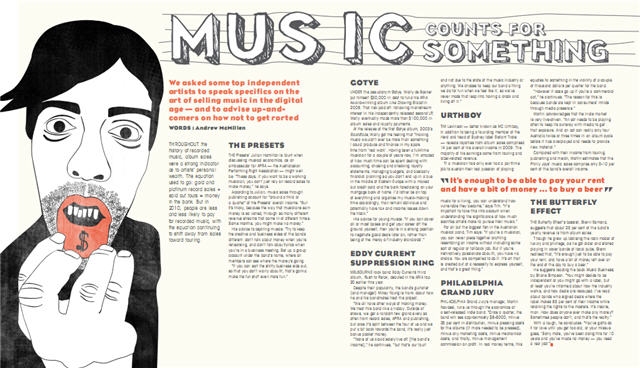

 Interview – John Butler
Interview – John Butler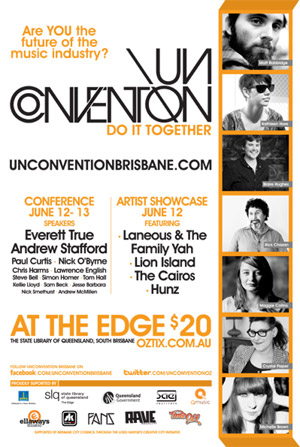 In whole, UnConvention Brisbane 2010 was a winner. I’m thrilled that 120 (or so) members of the city’s independent music scene were willing to spend their weekend – or at least, part of it – listening to and engaging with fellow venue operators, band managers, musicians, business owners and label representatives. For mine, this was the highlight: bringing people together, and putting them in a low pressure social space where they felt comfortable interacting with one another.
In whole, UnConvention Brisbane 2010 was a winner. I’m thrilled that 120 (or so) members of the city’s independent music scene were willing to spend their weekend – or at least, part of it – listening to and engaging with fellow venue operators, band managers, musicians, business owners and label representatives. For mine, this was the highlight: bringing people together, and putting them in a low pressure social space where they felt comfortable interacting with one another.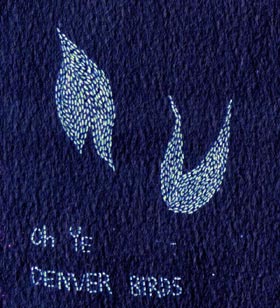 Oh Ye Denver Birds – Walls
Oh Ye Denver Birds – Walls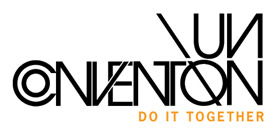 It’s a pleasure to be involved with an event that seeks to investigate how to sustain careers within Brisbane’s independent music industry. It’s important than ever to have these conversations. After spending a couple of years working in and around the local scene, I’m glad to be in a position to give something back.
It’s a pleasure to be involved with an event that seeks to investigate how to sustain careers within Brisbane’s independent music industry. It’s important than ever to have these conversations. After spending a couple of years working in and around the local scene, I’m glad to be in a position to give something back.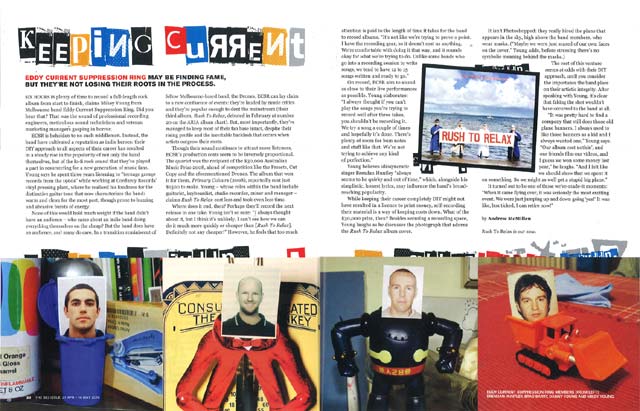

 The Beggars Group music blog strategy filters down to indie labels like Sydney’s
The Beggars Group music blog strategy filters down to indie labels like Sydney’s  Beyond Remote Control, EMI Music have maintained
Beyond Remote Control, EMI Music have maintained  Australian indie label
Australian indie label